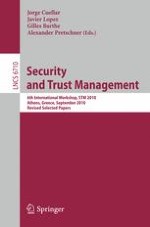2011 | Book
Security and Trust Management
6th International Workshop, STM 2010, Athens, Greece, September 23-24, 2010, Revised Selected Papers
Editors: Jorge Cuellar, Javier Lopez, Gilles Barthe, Alexander Pretschner
Publisher: Springer Berlin Heidelberg
Book Series : Lecture Notes in Computer Science
